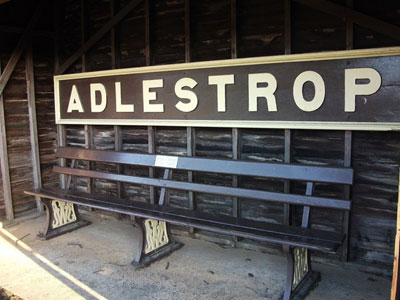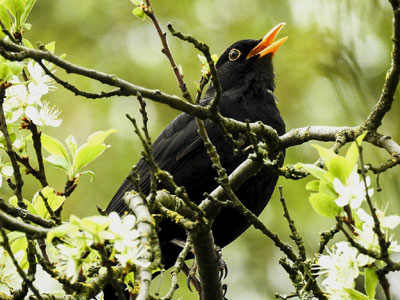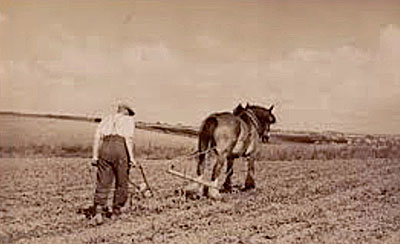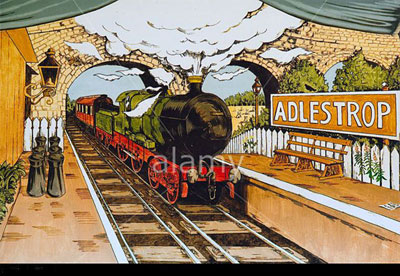|
ADLESTROP
Edward Thomas

Yes. I remember Adlestrop—
The name, because one afternoon
Of heat the express-train drew up there
Unwontedly. It was late June.
The steam hissed. Someone cleared his throat.
No one left and no one came
On the bare platform. What I saw
Was Adlestrop—only the name
And willows, willow-herb, and grass,
And meadowsweet, and haycocks dry,
No whit less still and lonely fair
Than the high cloudlets in the sky.
And for that minute a blackbird sang
Close by, and round him, mistier,
Farther and farther, all the birds
Of Oxfordshire and Gloucestershire.
On June 24, 1914, as Edward Thomas traveled by rail from London to
Malvern Parish in Worcestershire, he jotted down observations in his
notebook concerning a strange stop his train made at a rural station called
“Adlestrop.” Although Thomas’s friend, Robert Frost, had been urging him
to concentrate on writing poetry he had not yet begun to do so.
Since there isn’t any explicit mention of World War One in Adlestrop,
readers unaware of its historical context will probably just see the poet as
contemplating a mysterious pause in the busy, on-the-go tempo of modern
industrialized life, and seen that way, the poem has considerable power.
Still, just four days after Thomas’s trip, Archduke Franz Ferdinand of
Austria was assassinated at Sarajevo, and in August, England declared war
on Germany. By the time Thomas wrote Adlestrop in January of 1915, the
battles of the Marne and Aisne had already been fought and trench warfare
was well underway.
Thomas begins his poem with an interjection, implying that he is
responding to the mention of “Adlestrop” by a friend:
Yes. I remember Adlestrop—
That little word “yes,” followed by its reflective period, creates an intimate
bond between poet and reader, establishing what I like to call the You and I
of Poetry. The poet is speaking to you, reader. You are part of a
conversation. You are the friend who initiates the speaker’s story by
mentioning Adlestrop.
Thomas temporarily disconnects the first two words of his second line with
a long dash as he struggles to remember his connection to Adlestrop. When
he does come up with the words, they feel more like a discovery than a
memory. Whatever the tiny village of Adlestrop (its population less than
100 in 1914) means to others, the extra-long pause gives our friend time to
realize that—for him—Adlestrop is just a sound, a label without content;
that all he remembers is the name.
He struggles to go beyond the name by trying to recall exactly what
happened during the minute the train remained at the station. He
remembers that it was a hot summer afternoon; that “The steam hissed”
and “Someone cleared his throat.” He remembers that the train stopped
“unwontedly,” raising the implicit question: Why would an express train
draw up at a local station? Stop at a “bare platform” where:
No one left and no one came.
A “platform” can refer to a place where people get on and off trains; but
Webster’s first definition is “a raised flooring, such as a stage or dais.” We are at a train station; but Thomas’s language creates a negative allusion to
Jaques’ famous metaphor for human activity in Shakespeare’s
As You Like It:
As we look out the window with the speaker, all we see is a bare stage,
ready to accommodate a play that cannot begin. Someone clears his throat
but doesn’t go on stage to perform. No one comes and no one goes. There
aren’t any men and women who have “their exits and their entrances” here.
Though World War One is not explicitly mentioned in Adlestrop, it was on
everyone’s mind when Thomas wrote his poem in 1915, and even more so
when Adlestrop was published two years later. By then there were multiple
Theaters of War, and a whole generation of young men had already died
abroad or returned home horribly wounded. By 1917, soldiers would be
going to or from The Front on trains throughout England.
If I had to choose one word to characterize the disturbing, almost eerie
quietude of Thomas’s first two stanzas that word would be “lull.” While the
train stops, human activity, negative and positive, is suspended. The
welcome peacefulness that the lull provides sits uneasily with our feeling of
loneliness at what, ironically, such serenity requires: the complete absence
of humanity!
But there’s more to the story. In stanza three, the speaker’s memory
suddenly expands to include the wider landscape. Beyond the modern-day
train station, he discovers a world elsewhere—a timeless world of natural
beauty and human productivity.
His transition begins with the conjunction “and” which occurs six times as
the poem moves towards its conclusion, accelerating and smoothing the
pace in contrast to the halting tempo of the first two stanzas, where we felt
our friend struggling to recapture the past.
Now, memories flow lovingly and fluently off our friend’s tongue:
And willows, willow-herb, and grass,
And meadowsweet, and haycocks dry
No whit less still and lonely fair
Than the high cloudlets in the sky.

Like Robert Frost, Edward Thomas was an avid amateur botanist who
would have known that meadowsweet herb and willow herb have proven
medicinal uses, and meadowsweet flowers flavor wines, beers, desserts.
Though they are offstage, Adlestrop’s farmers have shaped and dried
“haycocks” to feed their livestock. Mankind’s involvement with nature here
is beneficial and non-invasive. The loneliness we feel is “fair” because the
land appears to be respected by those who work it.
So far, except for the hissing of steam and clearing of a throat, almost
everything in Adlestrop depends upon what the poet saw; and everything
is as “still” as “the high cloudlets in the sky.”
In his final stanza, Thomas expands his memory to include what he heard,
taking us fellow observers of nature, as far back as it is possible for our
species to go:
And for that minute a blackbird sang
Close by, and round him, mistier,
Farther and farther, all the birds
Of Oxfordshire and Gloucestershire.

Adlestrop is in Gloucestershire, just two miles from a boundary with
Oxfordshire. The lovely music becomes “mistier” as the poet’s imagination
moves “farther and farther” into the landscape, and “all the birds” of the
two shires sing. Thomas ends by reminding us that the joyous, intuitive
music of the natural world abides and will continue to thrive, no matter
how many wars continue to trouble mankind.
In the same year that Edward Thomas wrote “Adlestrop,” Thomas Hardy
wrote “In Time of the Breaking of Nations.” Hardy’s poem was published in
1916, a year before the publication of “Adlestrop.” His title and penultimate
line leave no doubt that he is thinking of WWI, along with all the wars in
our planet’s history:
I
II
III


Despite their rhetorical and stylistic differences, it’s almost as if Edward
Thomas and Thomas Hardy are friends talking to each other through their
poetry. They agree that cherishing what remains permanent in the worst of
times offers us solace. Both find the simplicity and beauty of nature and its
loving stewardship by ordinary men and women reassuring.
Note:
Adlestrop’s train station was discontinued in 1966 to reduce the cost
of running the rail network by closing unprofitable lines and stations. As of
2022 there were 81 men and women living in Adlestrop.
|